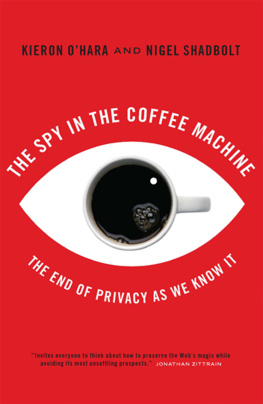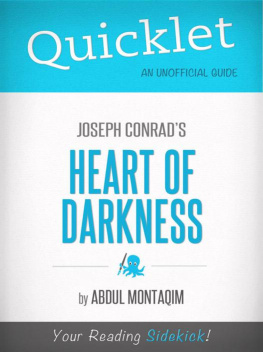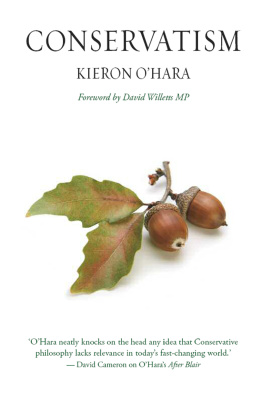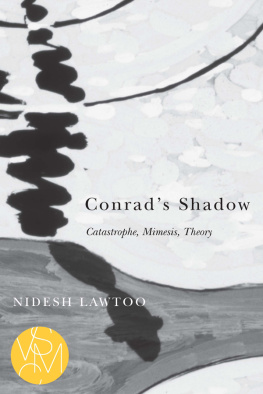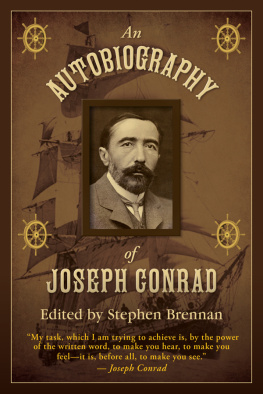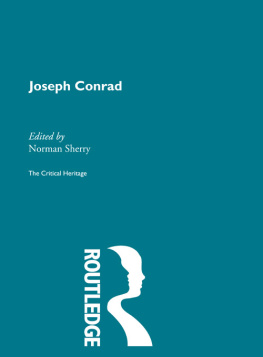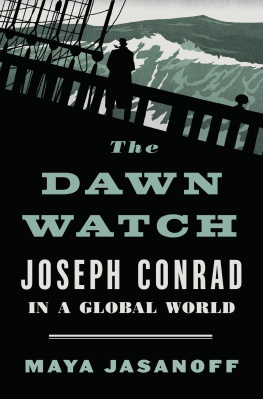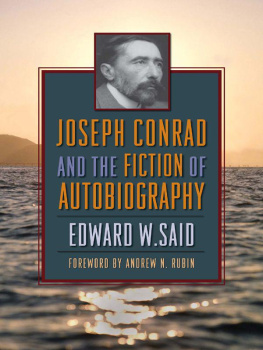Title Page
Joseph Conrad Today
Kieron OHara
Publisher Information
Published in the UK by Societas
Imprint Academic, PO Box 200
Exeter EX5 5YX, UK
Digital edition converted and distributed by
Andrews UK Limited
www.andrewsuk.com
SOCIETAS
essays in political & cultural criticism
imprint-academic.com
Copyright Kieron OHara, 2007, 2015
The moral rights of the author have been asserted.
No part of this publication may be reproduced in any form without permission, except for the quotation of brief passages in criticism and discussion.
Dedication
For Professor Rebecca Hughes
Chapter One
Still Sprightly at 150
It has been written that Joseph Conrad, great novelist of English, aristocratic stylist, pioneer of modernism, led three lives. He was the child of romantic Polish revolutionaries, from Berdyczw, a small town perpetually caught up in Great Power tugs of war, Lithuanian and Polish territory until the Second Partition of Poland in 1793 when it was annexed to Russia; it is now part of the Ukraine. Jzef Teodor Konrad Nalecz Korzeniowski was born a Pole, a nationality that no longer existed, on 3 rd December 1857. At the age of 17, he began a second life as a seaman, based originally in Marseilles, then England. And at the age of 31, he began writing a story that evolved into his first novel, Almayers Folly . It is this third life as a literary giant, author of fourteen novels, seven collections of stories, four collections of essays, plus a few plays and minor collaborations, that ensures Conrads lasting fame.
Conrads last novel, The Rover , was published in December 1923, and the bulk of his best work completed prior to the commencement of hostilities in 1914. In many ways, his world was unbelievably remote from ours. The 20 th century has given us extraordinary technological progress, undreamt-of prosperity, a spread of education and culture. Religion has waned and ideology waxed, superpowers risen and fallen, all against the background of fiercely murderous conflict across the globe.
Yet what strikes the reader of Conrads great works, Nostromo , The Secret Agent , Heart of darkness, is their extraordinary relevance to the politics of our age. More than, say, Orwells Nineteen Eighty-Four or Koestlers Darkness at Noon , to choose two magnificent political novels of the 20 th century, Conrad speaks to us directly. He communicates at a human level; he is close to Tolstoy in his ability to connect the individual with the global, the contingent human decision with the overarching political implications. Despite the technologically-inspired erosion of privacy of our era, Nineteen Eighty-Four still reads like a nightmare, a science fiction dystopia. Though it may be a possible end point of current trends, it is not here and now. But the author of Nostromo might easily be commenting directly on events in Venezuela or Bolivia in 2007; The Secret Agent might have been inspired by the attacks on the London Underground network in July 2005, instead of that on the Greenwich Observatory in 1894. Heart of darkness might have been set in Iraq.
In this book, my aim is to expand on the idea that an old-fashioned, crotchety, highly-strung novelist, living in relatively straitened circumstances as an exile writing in a foreign language, who (according to the self-consciously modern H.G. Wells) was not serious about social and political issues, had no sense of humour and a ridiculous persona of a romantic adventurous un-mercenary intensely artistic European gentleman carrying an exquisite code of unblemished honour through a universe of baseness -nevertheless speaks loudly and accurately in the world of George W. Bush, Osama bin-Laden, the World Wide Web, neo-liberalism and anti-globalisation. Is it his political wisdom? His understanding of the human condition? His experience of life?
And can his vision, pessimistic, self-consciously marginal and at times bordering on the nihilistic, inform us about the choices ahead of us? Can imaginative writings, one hundred years old, really be more au point than those of todays learned commentariat? Particularly as Conrad now has to be seen through the haze of a century of critical analysis. He has been adulated, despite manifest failings in even his greatest books. He has been called a racist, a sexist and an imperialist. One recent project was even dedicated to:
... the recovery, mapping, and invention of Conrad as a womans writer, a lesbian writer, an African, Indian, Indonesian, Jewish, Palestinian, Native American, and U.S. writer, a hybrid writer (culturally or narratively), a terrorist writer, a working-class writer, an AIDS or a disabled writer, an older writer, an immigrant writer, a popular writer, a writer written out of the power structure or beyond revolution by media and politics ... the secret Conrad of the twenty-first century.
It is reasonably safe to say that Conrad would have been astounded with many of these reinventions, with the possibly exception, given his perpetual impecuniousness, of popularity.
He was obviously a man of great, if uneven, talent. It is rare to find such a person with little useful to say, and Conrad has plenty to say. But he was awkward and negative. Whatever ones theory, whatever ones positive vision, one will find oneself under retrospective attack from Conrad. That is hard to take for those who prefer their perspectives sharp, their paths clear, be they readers of Marx, Hayek, Chomsky, Billy Graham or L. Ron Hubbard.
But the world has six billion inhabitants, believing five billion different things. Some people take a year to earn $300, while others manage it every couple of minutes. Gods and creeds struggle for recognition in peoples hearts and on their television screens. A few people are changing the very climate for everyone else. A few others threaten perpetual violence. Some wish to change their societies, others work hard to climb to the top of theirs. Still others wish merely to get by. In all this jumble, what path could be clear? What perspective could take in the whole scene?
Conrad is the stately chronicler of the human cacophony. His carefully crafted, slow, complex narratives relate the large to the small, individual decisions to the macro-level effects. Nothing in a Conradian world goes right, and nothing is what it seems. In one sense perspective is the last thing one would expect in his work - one of the very few metaphysical constants throughout his fiction is a brooding, inchoate darkness.
Novels, and art generally, are kinder to politics than is often thought. Writers often flatter themselves that they are exposing shams and evasions. Everyone looks down on the despised species of politicians, while few seem to worry overmuch about the evasions and shams of writers. But the often unstated assumption of an artistic commentator is that alternatives exist . The world may be run by businessmen, or the military-industrial complex, or the United States, or white people, and run badly (these propositions are of course true), but if only they could be resisted or deposed, all could be well (that proposition may well be false, and the few revolutionary occasions when it has been tested have not been happy ones). We can all agree that George Bush has made a mess of everything. But it does not follow from that evident truth that Hugo Chvez or Subcomandante Marcos would make a better job of it, even though they are cheered from the rafters from the safety of London or Paris for cocking a snook at everything Bush stands for. Conrad was not prey to that delusion, and exposes it time and again. That is what makes him awkward, and critics uncomfortable.
Korzeniowski
Young Korzeniowskis origins were decidedly unusual. His father Apollo was a tortured soul, haunted by Polands fate. Rather than hand out cigars upon the birth of young Jzef, he penned a Christening poem with the decidedly un-snappy title To my son born in the 85 th year of Muscovite Oppression, including the cheery lines You are without land, without love, without country, without people, while Poland - your mother - is in her grave.
Next page

